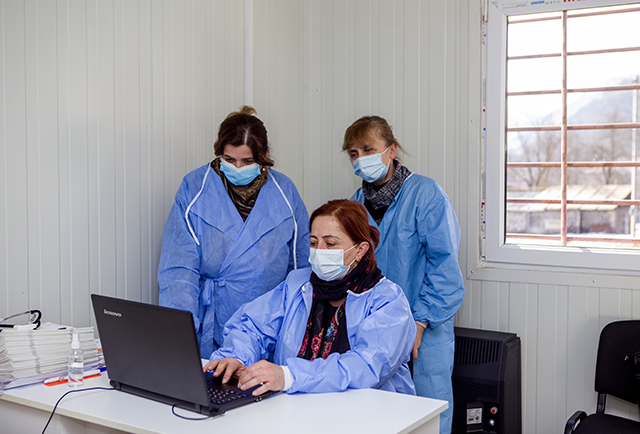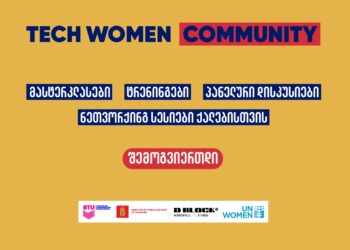Khatuna Gurgenidze, 47, has been working as a family doctor in Gudamakari Gorge, located in Dusheti Municipality, for 23 years. Despite the unusual geographical conditions of the highland region, and its severe climate, Khatuna visits patients using her own car, and provides medical services on the spot.
Within the framework of the Czech Development Agency-funded project, Caritas Czech Republic is working on capacity-building for Khatuna and her colleagues, and is introducing electronic information systems to make the work of rural doctors easier and more efficient.
Difficulties of Doctoring in Mountainous Gudamakari
Khatuna Gurgenidze has been working as a family doctor at the Gudamakari ambulatory in Dusheti Municipality for twenty-three years. Her childhood memories are associated with the small town of Ananuri of the same municipality, where she grew up in her grandmother’s house. Later, she graduated from the medical university in the capital and in 1999 returned to Dusheti to help the patients of her home region. Khatuna is a mother of three and a distinguished doctor of Gudamakari Gorge.
Khatuna serves a total of 580 patients, 80% of whom are elderly. As Dusheti municipality is located in the highland Mtskheta-Mtianeti region with hard geographical conditions and a severe climate, these people find it especially difficult to get to the rural ambulatory.
“I serve patients of 24 villages, which are many kilometers away from each other, so we have to visit and provide services to our patients at home. I often use my off-road vehicle to drive to their houses as our medical facility does not have its own. We often have to travel to the alpine zone – of course, we can not ignore patients’ requests, can we?! Our visits help them a lot, even in the cases when there is nothing serious to worry about”.

Caritas Czech Republic Improves the Quality of PHC Services in Georgia
Khatuna tells us that considering the hard working conditions, the support from the Caritas Czech Republic to improve the quality of primary healthcare services is an important step forward, both in terms of capacity-building of rural doctors and the number of recovered patients. Thanks to funding from the Czech Development Agency, Caritas Czech Republic works in all sixteen rural ambulatories in Dusheti Municipality to improve the quality of healthcare services.
Specifically, Caritas Czech Republic provided training sessions for the doctors on updated clinical protocols on the management of non-communicable diseases, which made a significant contribution to Khatuna’s and her colleagues’ professional development:
“The training sessions provided by Caritas Czech Republic have made it much easier to manage diseases like hypertension and diabetes, and have helped us improve the condition of patients,” she says.
“Sometimes, patients find it difficult to decide whether to start medical treatment or not, but capacity building and supportive supervision provided by Caritas Czech Republic have also taught us how to convince them to make the right decision.”
Moreover, Caritas Czech Republic also introduces electronic systems to rural doctors that have simplified their daily medical practice. Khatuna says that the introduction of an electronic medical records system is one of the important steps to simplify rural doctors’ medical practice in Dusheti municipality. She notes that working on paper-based medical records is no longer required, as electronic records from previous examinations are easily viewed in the unified electronic management information system. She says she values a lot the support of Caritas Czech Republic during the Covid-19 pandemic and states that the provided trainings greatly helped her to handle local cases of Covid-19.
Rusudan Chkhubianishvili, Caritas Czech Republic’s project manager, notes that through the project, our organization provides significant support to the Government of Georgia:
“Individual work with medical staff and on-the-job training is a novelty in the Georgian reality, and aims to provide evidence-based medical information to rural doctors and nurses, who have not been able to update it and who rely on their diligence and efforts to obtain reliable and valid information on the management of common diseases and their prevention approaches.”
Caritas Czech Republic is working to improve the quality of primary healthcare services in Georgia with the financial support of the Czech Development Agency. Project activities include introducing updated clinical protocols for family doctors, developing and implementing IT solutions nationwide, updating the standards and requirements for primary healthcare staff qualifications, and establishing a continuing medical education system for primary healthcare in Georgia.
This material was prepared in the scope of the project financed within the Official Development Assistance of the Czech Republic and implemented through the partnership between Czech Development Agency and Caritas Czech Republic.
By Nina Kopaleishvili
















